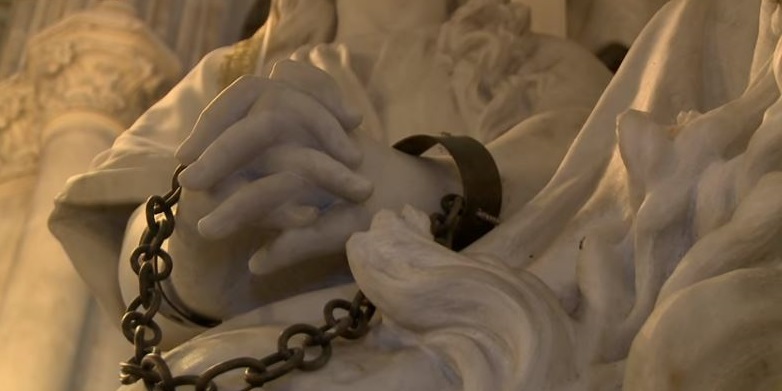-The Apostolic Penitentiary, described by Pope Francis as the“tribunal of mercy“, is the supreme tribunal of the Catholic Church and deals with granting forgiveness to the penitent in particular cases such as, for example, excommunication, interdictions, sacrileges against the Eucharist, etc.
-The Apostolic Penitentiary is responsible for all matters concerning the internal forum and indulgences, which are expressions of divine mercy. It is directed by the Major Penitentiary, assisted by the Regent and supported by several officials.
-The Apostolic Penitentiary is responsible for all matters concerning the granting and use of indulgences, without prejudice to the competence of the Dicastery for the Doctrine of the Faith to examine all matters of doctrine, and of the Dicastery for Divine Worship and the Discipline of the Sacraments in ritual matters.
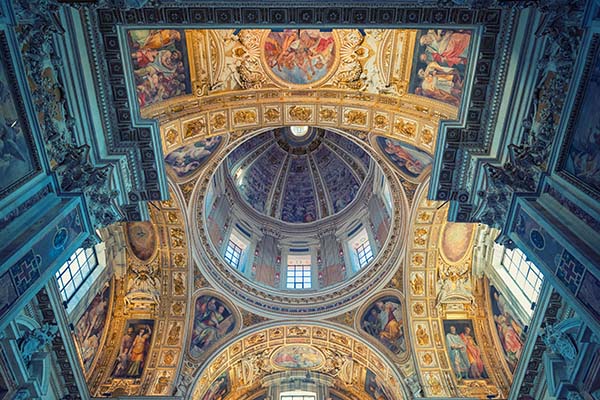
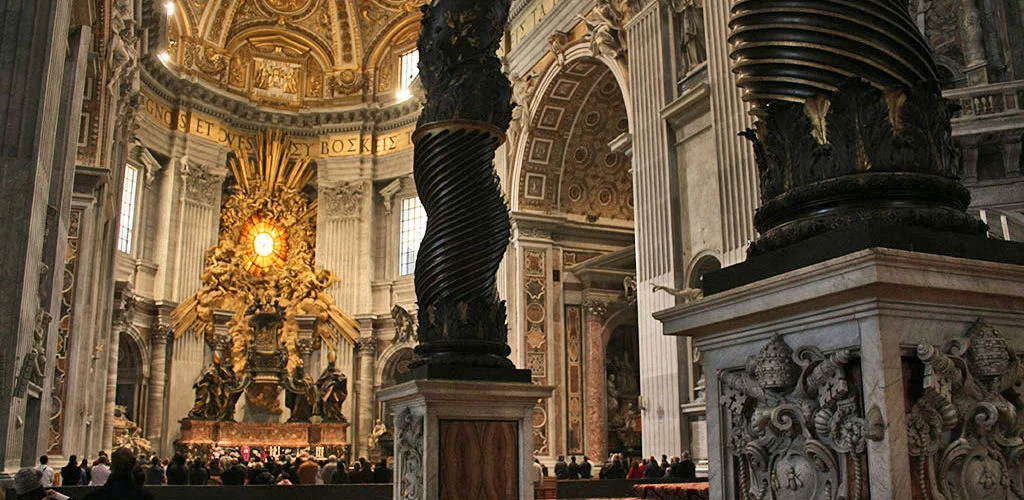
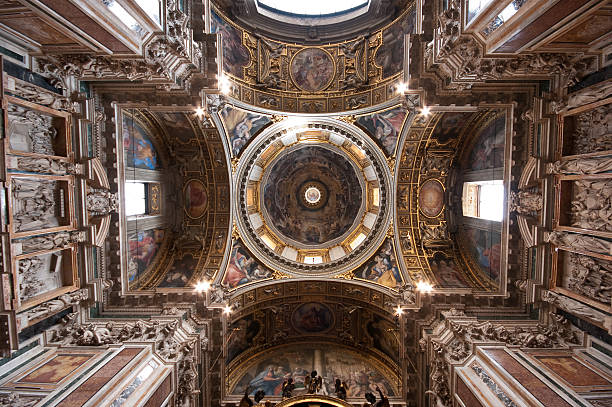
Note on the plenary indulgence granted during the Ordinary Jubilee of the Holy Year 2025
Angelo Card. de Donatis, major penitentiary, and H.E. Mgr Krzysztof Nykiel, regent.
“The time has come for a new Jubilee in which the Holy Door will once again be opened wide to offer the living experience of God’s love”. (Spes non confundit, 6). In the Bull of Indiction for the Ordinary Jubilee of 2025, the Holy Father, at this moment in history, when “Forgetful of the tragedies of the past, humanity is undergoing a new and difficult trial, which sees many populations oppressed by the brutality of violence. (Spes non confundit, 8), calls all Christians to become pilgrims of hope. It’s a virtue to be rediscovered, through the signs of the times “which contain the yearning of the human heart, in need of God’s saving presence, (and) ask to be transformed into a sign of hope”.. (Spes non confundit, 7), which we must expect first and foremost from God’s grace and the fullness of His mercy.
In the Bull of Indiction for the 2015 Extraordinary Jubilee of Mercy, Pope Francis already emphasized how, in this context, the Plenary Indulgence took on “particular importance” (Misericordiae vultus, 22), insofar as God’s mercy becomes “the indulgence of the Father, who reaches out to the forgiven sinner through the Bride of Christ, and frees him from all that remains of the consequences of sin”. (ibid.). In the same way today, the Holy Father affirms that the gift of the Indulgence “allows us to discover just how unlimited God’s mercy is. It is no coincidence that, in ancient times, the term ‘mercy’ was used interchangeably with the term ‘indulgence’, precisely because the latter is intended to express the fullness of God’s forgiveness, which knows no limits”. (Spes non confundit, 23). Indulgence is therefore a Jubilee grace.
On the occasion of the Ordinary Jubilee of 2025, this “Tribunal of Mercy”, whose task it is, according to the will of the Supreme Pontiff, to establish the conditions for the granting and reception of the Indulgence, intends to arouse and foster in the souls of the faithful the desire to obtain the Indulgence as the gift of grace proper to each Holy Year. It thus establishes the following prescriptions, so that the faithful can adopt “the provisions for obtaining and making effective the practice of the Jubilee Indulgence. “ (Spes non confundit, 23).
The other concessions concerning the Indulgence remain in force during the Ordinary Jubilee of 2025.
The truly repentant faithful, apart from attachment to sin (cf. Enchiridion Indulgentiarum, IV ed., norm. 20, § 1) and animated by a spirit of charity who, during the Holy Year, purified by the sacrament of penance and nourished by Holy Communion, pray for the intentions of the Supreme Pontiff, will obtain from the treasury of the Church, a full indulgence, the remission and pardon of their sins, applicable to the souls in Purgatory:
I – During pilgrimages
The faithful, pilgrims of hope, can receive the Jubilee Indulgence granted by the Holy Father if they make a pilgrimage :
-
- at any Jubilee site. They will devoutly take part in Mass (whenever liturgical norms allow, the Mass proper for the Jubilee can be celebrated, or the votive Mass for reconciliation, for the forgiveness of sins, to ask for charity and for understanding between peoples), in a ritual Mass for the sacraments of Christian initiation or the anointing of the sick, a celebration of the Word of God, the Liturgy of the Hours (Office of Readings, Lauds, Vespers), the Stations of the Cross, the Rosary, the Acathist hymn, a penitential celebration with individual confession by penitents, as provided for in the Rite of Penance (2nd form).
-
- in Rome: in one of the four papal basilicas: Saint Peter in the Vatican, Saint John Lateran, Saint Mary Major, Saint Paul Outside the Walls.
-
- in the Holy Land: in one of three basilicas: the Holy Sepulchre in Jerusalem, the Nativity in Bethlehem, and the Annunciation in Nazareth. In other ecclesiastical districts : in the cathedral or other locations chosen by the local Ordinary.

II – During a visit to a sacred site
- The faithful can also receive the Jubilee Indulgence if they visit a Jubilee site, either individually or in a group. There, they will experience a suitable time of Eucharistic adoration and mediation, concluded by the Our Father, the Creed, and the invocation to Mary, Mother of God. In this way, everyone “can experience the closeness of the most affectionate of mothers, who never abandons her children” (Spes non confundit, 24).
- On the occasion of the Jubilee Year, in addition to the well-known pilgrimage sites, other sacred sites can be visited under the same conditions:
- in Rome: the Basilica of the Holy Cross of Jerusalem, the Basilica of San Lorenzo al Verano, the Basilica of San Sebastiano (a visit to the “seven churches” so dear to St. Philip Neri is recommended), the Sanctuary of Divine Love, the Church of the Holy Spirit in Sassia, the Church of St. Paul at the Three Fountains, site of the Apostle’s martyrdom, the Christian catacombs, the churches along the Jubilee Way dedicated to the Iter Europaeum, and the churches dedicated to the women Patrons of Europe and Doctors of the Church (Basilica of Saint Mary sopra Minerva, Saint Brigid in Campo dei Fiori, Church of Saint Mary of Victory, Church of the Trinity of the Mounts, Basilica of Saint Cecilia in Trastevere, Basilica of Saint Augustine in Campo Marzio).
- in other places around the world: the two minor papal basilicas of Assisi, Saint Francis and Saint Mary of the Angels, the pontifical basilicas of Our Lady of Loreto, Our Lady of Pompeii, Saint Anthony of Padua, any minor basilica, cathedral or co-cathedral church, Marian shrine, as well as any collegiate church or shrine chosen by the bishop for the good of the faithful, any national or international shrine, “holy places of welcome, and privileged spaces for fostering hope” (Spes non confundit, 24), chosen by the Bishops’ Conference. The truly repentant faithful who are unable to take part in solemn celebrations, pilgrimages or visits for just reasons (such as cloistered nuns and monks, the elderly, the infirm, those in the service of the sick in hospitals or other places of care), will benefit from the Jubilee Indulgence under the same conditions, united spiritually to the faithful present, especially when the words of the Supreme Pontiff and diocesan bishops are retransmitted by the media. At home or wherever they are being held (e.g. in the chapel of a monastery, hospital, nursing home, prison, etc.), they will recite the Our Father, the Creed according to the legitimate forms, and other prayers in keeping with the aims of the Holy Year, offering up their sufferings or the difficulties of their lives.
III – In works of mercy and penance
In addition, the faithful can receive the Jubilee Indulgence by devoutly participating in popular missions, spiritual exercises, or formation meetings on the texts of the Second Vatican Council and the Catechism of the Catholic Church, which take place in a church or other suitable place, according to the Holy Father’s intention.
- Souls in Purgatory Purgatorial souls: notwithstanding the norm which prevents receiving the Plenary Indulgence more than once a day (cf. Enchiridion Indulgentiarum, IV ed., norm. 18, § 1), the faithful who have done charitable work for the souls in purgatory, if they legitimately access the sacrament of communion a second time on the same day, may receive the Plenary Indulgence twice, applicable only to the deceased (within a Eucharistic celebration, cf. can. 917 and Pontifical Commission for the Authentic Interpretation of the CIC, Responsa ad dubia, 1, July 11. 1984). This double oblation is a praiseworthy exercise in supernatural charity. The link, within the Mystical Body, between the faithful who are still on pilgrimage on earth, and those who have reached the end of their journey, is thus made manifest by the fact that “The Jubilee Indulgence, in virtue of prayer, is destined in a special way for those who have gone before us, so that they may obtain full mercy. (Spes non confundit, 22).

- Because, “during the Jubilee Year, we will be called to be tangible signs of hope for many brothers and sisters who live in conditions of distress” (Spes non confundit, 10), the Plenary Indulgence is linked in a special way to works of mercy and penance, which bear witness to the conversion undertaken. (Spes non confundit, 10) the Plenary Indulgence is linked in a special way to works of mercy and penance, which bear witness to the conversion undertaken. Following Christ’s example and command, the faithful are invited to show mercy and charity, especially to those most in need. More specifically, they will rediscover :
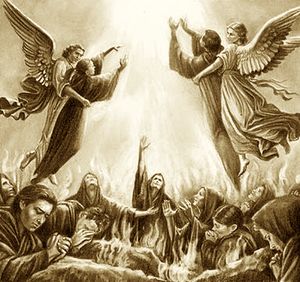
- ” corporal works of mercy: feeding the hungry, giving drink to the thirsty, clothing the naked, welcoming strangers, assisting the sick, visiting prisoners, burying the dead”. (Misericordiae vultus, 15);
- as well as ” spiritual works of mercy: advising those in doubt, teaching the ignorant, warning sinners, consoling the afflicted, forgiving offenses, bearing patiently with annoying people, praying to God for the living and the dead”. (ibid.).
In the same way, the faithful can benefit from the Jubilee Indulgence by visiting, for a sufficient period of time, people in difficulty (the infirm, prisoners, the elderly, the handicapped…) , thus accomplishing a pilgrimage to Christ present in them (cf. Mt 25, 34-36). By complying with the spiritual, sacramental and prayer conditions, the faithful will certainly be able to repeat such visits throughout the Holy Year, receiving a Plenary Indulgence every time, even every day.
The Plenary Indulgence will also be received through initiatives that concretely and generously put into practice the spirit of penance that is the soul of the Jubilee.
In particular, the aim is to rediscovering the penitential value of Friday :
- abstaining, at least for a day, from trivial distractions (real or virtual, conveyed by the media and social networks),
- of superfluous consumption (e.g. by fasting or practicing abstinence according to the norms of the Church or bishops),
- as well as allocating a sum of money to the poor,
- supporting religious or social activities, in particular to defend and protect the quality of life in all its stages, abandoned children, young people in difficulty, elderly people in need or isolated, migrants from various countries “who abandon their homeland in search of a better life for themselves and their families “. (Spes non confundit, 13),
- devoting an appropriate amount of free time to voluntary work, community service or other forms of commitment.
At the most opportune moment during this jubilee period, on the occasion of a celebration in the cathedral or in a jubilee church, diocesan bishops, eparchial leaders, and those considered equivalent by law, may impart the Pontifical Blessing with plenary indulgence, to all the faithful who receive this Blessing under the usual conditions.
In order to facilitate access to the sacrament of penance and thus God’s forgiveness through the power of the Keys, Ordinaries are invited to concede to canons and priests, who will be able to hear the confessions of the faithful in the cathedrals and churches chosen for the Holy Year, the option limited to the internal forum, for members of the Eastern Churches canon 728, § 2 of the CCEO, and for a possible reservation canon 727, with the exception of the cases mentioned in canon 728, § 1, for the faithful of the Latin Church, the faculty set out in canon 508, § 1 of the CIC.
In this regard, the Penitentiary invites all priests to make the generous gift of themselves, in order to offer the faithful the opportunity to benefit from the means of salvation. To this end, they will make public the times of confessions, in agreement with parish priests and church rectors, making themselves present in the confessional, programming penitential celebrations at a frequent rhythm. Priests who, for reasons of age, no longer have a defined ministry, will also make themselves available. Wherever possible, in accordance with the Motu proprio Misericordia Dei, the pastoral desirability of hearing confessions during the celebration of Mass should be emphasized.
To assist confessors, the Apostolic Penitentiary, by mandate of the Holy Father, establishes that priests who accompany or join jubilee pilgrimages outside their diocese, may enjoy the faculties granted to them in their diocese by legitimate authority. The Apostolic Penitentiary will grant special faculties to confessors of papal basilicas, canons and diocesan priests in the various ecclesiastical circumscriptions.
Having duly informed the faithful of the seriousness of the sins associated with a censure or reservation, confessors will, with pastoral charity, determine a sacramental penance capable of fostering genuine repentance, and depending on the case, repairing any consequences or scandals.
The Penitentiary warmly invites bishops, as holders of the triple munus of teaching, guiding and sanctifying, to take care to set out clearly the existing provisions for the sanctification of the faithful, taking into account the particular circumstances of place, culture and tradition. A catechesis adapted to the socio-cultural characteristics of each people can effectively propose the Gospel and the value of the Christian message, deeply rooting in hearts the desire for this unique gift, obtained by virtue of the Church’s mediation.
This Decree is valid for the entire jubilee year of 2025, notwithstanding any provisions to the contrary.
Given in Rome, at the Apostolic Penitentiary, on May 13, 2024, in memory of the Blessed Virgin Mary of Fatima.
Pope grants plenary indulgence for Jubilee 2025.
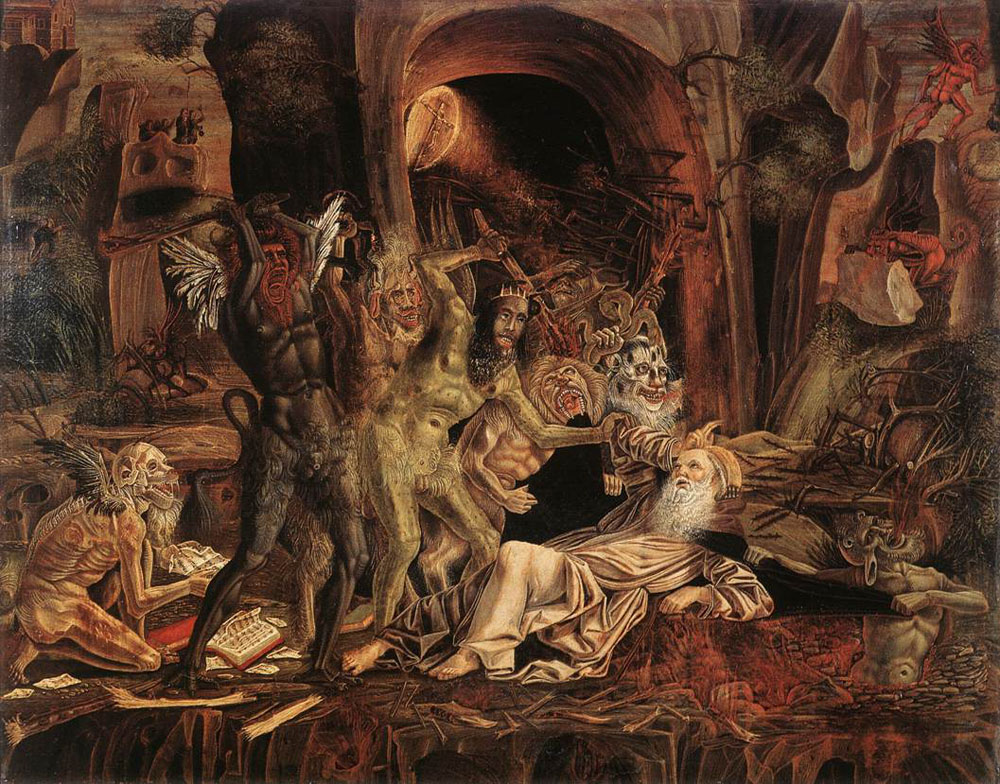
“Saint Anthony’s battle against temptation
Abbot, First Father of the Solitaries of Egypt
(251-356) celebrated on January 17
Antony was born in Como, in Upper Egypt. If the glory of the hermit Paul is to have given the first known example of the hidden life in the desert, that of Antony is to have united peoples of solitaries under the rules of a common life. Antony had received a profoundly Christian upbringing from his parents.
Shortly after their death, at the age of eighteen, he heard these words of the Gospel read in church: “If you want to be perfect, go, sell everything you have and give the price to the poor.” He immediately took these words to heart, and wishing to fulfill them to the letter, he withdrew to the desert, where he divided his time between prayer and work; his only meal after sunset was a little bread, salt and water, and he sometimes abstained for up to four whole days; what little sleep he allowed himself, he took on a simple rush mat or on the bare earth.
On two occasions, he went deeper into the desert and sank deeper into penance and prayer. Persecution drives him back into the world: “Let us go,” he said, “to see the triumphs of our brothers who fight for the cause of God; let us go and fight with them.” We saw him relieving the confessors of Jesus Christ in the dungeons, accompanying them before the judges and exhorting them to constancy. His courage astonished judges and executioners alike, and a hundred times he went before martyrdom, but God had another crown in store for him.
When persecution ceased, he returned to the desert, founded monasteries and became the father of a multitude of religious. The work of their hands, the singing of hymns, the reading of the Holy Books, prayer, fasting and vigils were their life.
The desert, inhabited by angels, flourished with every virtue, and Anthony was the soul of this great cenobitic movement.
He died at the age of one hundred and five. His joy at leaving this earth was so great that he seemed to see heaven open before his eyes, and the heavenly spirits ready to escort him.
St Anthony is particularly famous for his battles with demons. Infernal legions would strike him and leave him half-dead; the evil spirits would take on the most horrible forms to frighten him, but he scoffed at their efforts. After driving them away with the sign of the cross, he said: “Where have you been, Lord? he cried, and God answered: “Antony, I was with you, rejoicing in your victory.”
